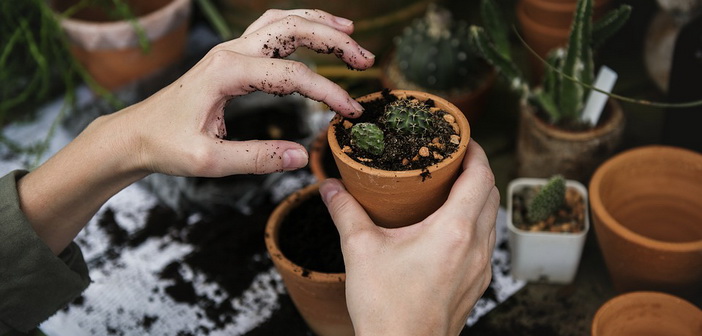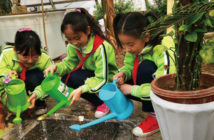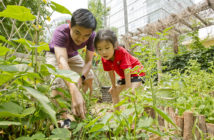We’re living in an ever-changing world, where consumption keeps rising and where the air, the water and the environment are ignored. For children living in the city, they don’t usually have the opportunity to experience and be close to nature. The majority of our next generation have little knowledge about the environment.
The “Nurseries for Nurseries” (N4N) competition is a project launched by the French Embassy in China and Limagrain China to grow vegetable gardens in kindergartens and primary schools. The idea is to provide children with a new perspective of the environment, to reconnect them with nature by touching, feeling, learning about, and understanding vegetables and plants.

Students planting the seeds.
It is open to any school wishing to participate as long as it is the children themselves who do the growing and the gardening. There are 40 schools in Beijing and another 62 around China involved this year.
Each participating school was provided with a starting kit that includes seeds, organic fertilizers, gardening tools, soils, as well as ongoing practical day-to-day advice about how to plant and grow vegetables in plots, pots or planters throughout the duration of the project.
“Our children are the first to be affected by pollution, by chemicals, by substances that can be quite dangerous when used for growing plants”, says Amanda Galsworthy, the found of N4N, explaining why N4N project chose school-age children as the target group.
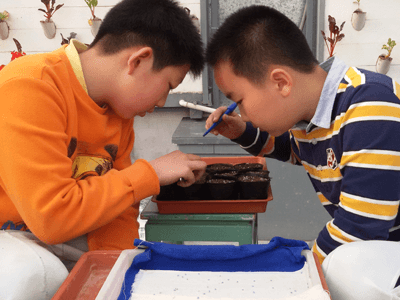
Students observe and make note of how the plants grow.
“So what N4N wants to bring is an alternative option for the new generation. They can grow their own vegetables. It is important that the children can understand that they can all be part of a change, that we can all be part of a change. And we want to try to give the children the keys and knowledge to become these change makers,” says Marion Lespine, another co-founder of N4N project.
Schools are pleased to be in part of the project and believe that after taking part in growing and gardening, children grew to have a good connection with the nature after watering, fertilizing and taking good care of the plants. So do the parents of these participating students.
“We decided to take part in this project because we think it’s a wonderful opportunity for the children and us to learn together about the environment, the process of gardening, and the methods to make the plants grow better, while also teaching our children how to co-exist with nature in a harmonious way. We’re very moved by the growth process because it gives us the chance of spending some precious moments with our children,” said Lin Gang, a parent of a student from Beijing Primary School who shared his experience with N4N.
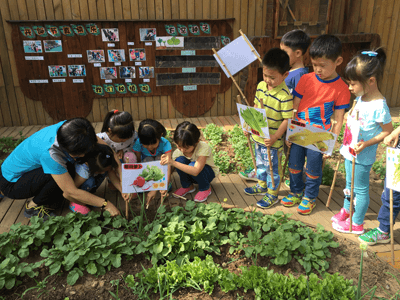
Participating students make plant tags for their small farm.
Some schools encourage students in higher grades to work together with younger students, to oversee the whole gardening process including watering, fertilizing, germination, and transplantation, as they believe it’s also a great opportunity for students to make new friends and form a sense of teamwork and responsibility.
“I think the most noticeable feeling I get from my students is that their group responsibility has been greatly improved after taking parting into the project,” says Huang Weibin, research director of Nanqiao Primary School. “They took care of the garden as if it was their own house.”
“Nature is a home where plants, animals and humans live in harmony. This is our mother earth. The air we breath, the water we drink, the food we eat, are all affecting our health condition. This is why we should take care of the environment, because taking care of nature is taking care of us, of our future”, says Zhang Yaqi, a student from Zizhong Primary School. She might be a very good example showing how the gardening experience gave students a new understanding of nature.
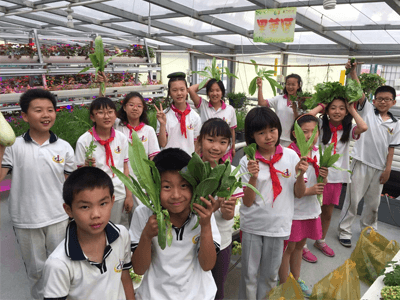
Participating students harvest the vegetables they grew with a smile
“The challenges we face are great when it comes to saving this planet, or ensuring it’s in good shape when we handed over to our children. Therefore I think the project is about not waiting for others to do things for us, but to do it ourselves. And even if you’re just growing a tomato in a pot on your balcony, it is an important contribution to making sure that our children can live in a healthier and safer environment,” Mrs Galsworthy added.
Photos: Pixabay, jardins.faguowenhua.com

